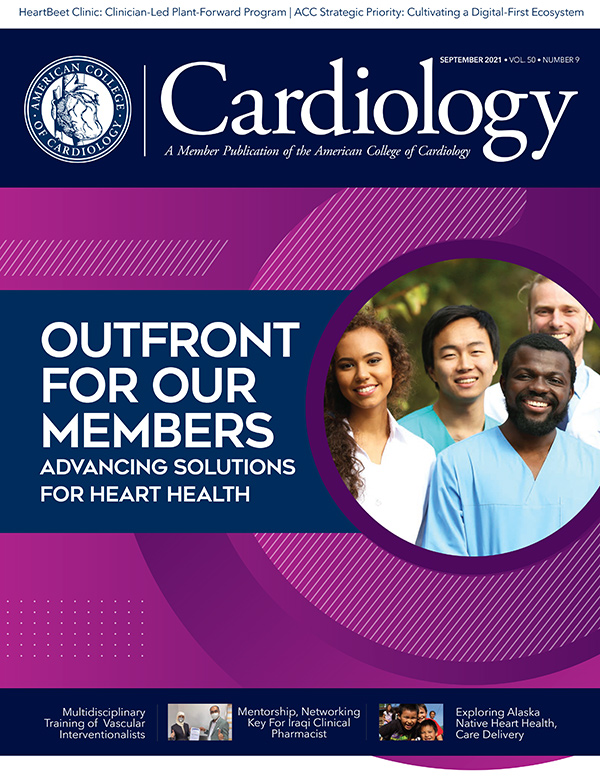Cover Story | ACC: OutFront For Cardiovascular Clinicians Worldwide

Over the last 70 years, the ACC has evolved into a global leader in transforming cardiovascular care and improving heart health. With more than 54,000 members worldwide, the ACC has been – and continues to be – instrumental in harnessing innovation and knowledge to optimize patient care and outcomes, while also growing the next generation of cardiovascular clinicians and leaders. The following pages offer a snapshot of some of the many ways the ACC is rising to meet the challenges of today, while identifying opportunities to advance real solutions for tomorrow.
MODERN
Modernizing Cardiovascular Care
Socrates once said: "The secret of change is to focus all of your energy, not on fighting the old, but building on the new." This secret hasn't been lost on the cardiovascular profession, which has a long history of leveraging new ideas, technologies and treatments that can be credited for the dramatic decline in cardiovascular mortality over the last many decades. The ACC has worked side-by-side with its members along the way, using the latest technologies and trends to provide education, tools and resources to help clinicians implement the "new" at the point of care.
Over the last several years, the College has taken an even more proactive approach to "building on the new" with the creation of a comprehensive Innovation Program designed to bring a clinical view and a patient voice to medical innovation. "It is our goal to search for, aid and promote the development of technologies that will enable our members to advance the care of their patients," said Richard A. Chazal, MD, MACC, chair of ACC's Innovation Development Work Group and an ACC past president.
To date, the ACC's Innovation Program has engaged stakeholders across the health care spectrum, built strategic alliances around the world, and developed novel collaborations with technology companies and health care startups that have the potential to modernize the delivery of care now and into the future. Whether it's using artificial intelligence and big data to ensure the right care to the right patient at the right time or advancing the capabilities and benefits of virtual care and remote monitoring, the ACC working with its members is moving the profession forward.
ADVANCED
Advancing Knowledge Through JACC Journals
The ACC has long served as the preeminent source for advancing knowledge related to cardiovascular care, thanks in large part to the Journal of the American College of Cardiology and the broader family of JACC Journals, now numbering 10 in total.
The JACC Journals family of peer-reviewed journals cover a wide range of cardiovascular clinical topics including basic to translational science, cardio-oncology, clinical electrophysiology, heart failure, imaging and interventional cardiology. Additionally, the new JACC: Asia is the first region-specific journal publishing original manuscripts focused on Asian populations and by Asian authors, while JACC: Case Reports offers a unique blend of clinical cases, global health reports and viewpoints focused on clinical problem solving. JACC: Advances, which is slated to launch in 2022, will explore new and emerging areas of cardiovascular care.
Under the leadership of JACC Editor-in-Chief (EIC) Valentin Fuster, MD, PhD, MACC, and the EIC's of the other JACC Journals, all 10 publications are constantly finding ways to innovate, collaborate, and leverage new technologies and communication platforms like podcasts and social media to communicate the latest and best cardiovascular research.
To date JACC Journals have a home on Twitter, Facebook, LinkedIn, Instagram and WeChat, while the recently revamped JACC.org website not only includes access to each of the journals, but to dedicated clinical topic collections, guideline hubs and CME/MOC activities as well. Events like this month's Journal Club hosted by JACC: Case Reports and JACC: Imaging and looking at a multimodality approach to anomalous coronary arteries are also making it easier to not only access information but engage in discussion around hot topics in cardiovascular care.
This continued commitment to providing the best resources for cardiovascular investigators, clinicians and specialists at every professional stage is why all the journals continue to rank among the highest in the field of cardiology in Impact Factor and by Google Scholar and why ACC members continue to rank the journals among the leading benefits of ACC membership.
AGILE
Showcasing Agility Through Education and Advocacy
The COVID-19 pandemic has served to highlight just how quickly the ACC can pivot to quickly adapt to the rapidly changing world and provide clinicians with the tools and resources to do what they do best – help and heal.
From pulling together an entirely virtual Annual Scientific Session in less than three weeks and setting up a comprehensive COVID-19 Hub for the sharing of research and best practices, to quickly and proactively engaging with members of Congress and key federal regulatory agencies around the need for telehealth flexibilities, the ACC showcased its agility and cemented itself early on in the pandemic as a trusted leader and advocate.
While the ACC had been exploring opportunities for members to engage virtually with live events like the Annual Scientific Session, whether live-streaming key Late-Breaking Clinical Trials or offering on-demand sessions post meeting, over the last decade, the COVID-19 pandemic changed the game completely, moving digital education from an option to the norm in a blink of the eye.
Over the last year and a half much has been learned about digital education, with the ACC setting the standard for large-scale meetings and demonstrating that virtual learning can be highly effective, engaging and meaningful. Novel educational platforms are helping clinicians achieve their learning objectives and stay current with the latest science and technologies, while also fostering networking and collaboration on a global scale. (Several of these educational efforts were recently recognized with prestigious awards. Click here for the details.)
Education isn't the only area requiring agility. Under the leadership of ACC's Health Affairs Committee, the College has been proactively advocating on behalf of clinicians and patients on critical issues like telehealth, clinician safety, access to care, provider relief funding and more. To date, the College and its members have been instrumental in shaping and influencing policies, programs and legislation during this time. "If this isn't the definition of ACC's Advocacy goal to 'own the problem and advance solutions,' I don't know what is," said ACC Past President Athena Poppas, MD, MACC, during last year's Legislative Conference.
VISIONARY
Envisioning a CV Disease-Free World
Achieving the ACC's Vision of a world where innovation and knowledge optimize cardiovascular care and outcomes requires not only anticipating the needs of cardiovascular clinicians and patients, but a long-term commitment to advancing solutions to improve the standard of cardiovascular care. The Global Heart Attack Treatment Initiative (GHATI) and the ever-growing NCD Academy are two examples of just how the ACC is doing both.
Launched in 2019, GHATI has already had measurable positive impacts on care delivery for heart attacks in low- and middle-income countries. The program brings together ACC experts from around the world, including members of the College's Assembly of International Governors, with cardiology teams at participating institutions to establish systems for tracking patient encounters and collecting data on outcomes. In its first year, 18 medical centers in 13 countries on four continents have been participating in the program, but the hope according to Benny J. Levenson, MD, PhD, FACC, immediate past chair of GHATI, is to "continue to grow the program to be a model for many other countries to improve systems of care for heart attack and ultimately make a big impact on reducing mortality."
The NCD Academy, a visionary online program that builds on ACC's Global Prevention Program launched in 2016, aims to equip primary care clinicians worldwide with the latest science and resources needed to stem the rising tide of cardiovascular disease and reinforce best practices in treating patients along the cardiovascular disease continuum. The free program uses eLearning technology to enable interactive patient cases and games in a fully on-demand and mobile-friendly environment. Content is developed through an interdisciplinary partnership network of advocacy organizations and medical societies led by the ACC. Current NCD Academy courses address cardiovascular disease and stroke prevention, cancer and mental health, with courses on diabetes, chronic respiratory diseases, advocacy and social determinants of health planned for the future.
COLLABORATIVE
Collaborating to Achieve Diversity, Equity and Inclusion
Transforming cardiovascular care and improving heart health can't be done alone, which is why the ACC's relationships with its state and international chapters, as well as partner cardiovascular societies in the U.S. and around the world are so important. Collaboration allows for broader reach and engagement and the ability to leverage collective strengths to achieve goals.
Nowhere is the need for collaboration greater than in the areas of diversity, equity and inclusion. The College's long-term commitment to growing a diverse and inclusive pipeline of new cardiovascular clinicians and leaders is predicated on working with its chapters and partner societies to develop and implement clinician education and training, offer mentoring and leadership opportunities, and find innovative ways to engage with middle school and high school students, medical students, fellows in training and early career clinicians, and others to encourage careers in cardiovascular medicine. Fostering a profession that is as diverse as the patient populations it represents requires everyone working together toward common goals.
Health equity is another critical area for collaboration. The ACC has joined with partner societies like the Association of Black Cardiologists, American Heart Association, American Medical Association, and others several times in the past year to speak out against racism and violence, which disproportionately affect Black, Latinx and other communities. COVID-19 has also served to underscore disparities in patient access to care and the ACC, along with its chapters and partner societies, have collaborated on joint letters to Congress and key federal agencies, as well as provided expert guidance and resources on the topics of bias and social determinants of health.
"The ACC understands that complex problems simply cannot be solved by one organization. This is especially true when it comes to achieving health equity," said ACC President Dipti Itchhaporia, MD, FACC, in a recent JACC Leadership Page. "Health inequities are so entrenched that it will require coordinated, multi-sector efforts that can inspire a shared vision, help bridge siloes, and create lasting change."
Clinical Topics: Arrhythmias and Clinical EP, Cardiovascular Care Team, COVID-19 Hub, Heart Failure and Cardiomyopathies, Implantable Devices, SCD/Ventricular Arrhythmias, Atrial Fibrillation/Supraventricular Arrhythmias, Acute Heart Failure
Keywords: ACC Publications, Cardiology Magazine, Academies and Institutes, African Americans, American Heart Association, American Medical Association, American Natives, Artificial Intelligence, Awards and Prizes, Big Data, Capparis, Cardiologists, Cardiology, Cardiomyopathy, Hypertrophic, Cardiovascular Diseases, Cardiovascular System, Cohort Studies, Communication, Computer-Assisted Instruction, COVID-19, Curriculum, Delivery of Health Care, Developing Countries, Diabetes Mellitus, Electrophysiology, Family Characteristics, Feedback, Fellowships and Scholarships, Genetic Testing, Global Health, Goals, Health Equity, Health Services Accessibility, Heart Diseases, Heart Failure, Internship and Residency, Journal Impact Factor, Latin America, Leadership, Medicine, Mental Health, Mentors, Motivation, Myocardial Infarction, Neoplasms, New Orleans, Noncommunicable Diseases, Nurse Practitioners, Pandemics, Patient Care, Physician Assistants, Point-of-Care Systems, Policy, Problem Solving, Publishing, Racism, Reference Standards, Research Design, Research Personnel, Retirement, Schools, Social Determinants of Health, Social Media, Societies, Medical, Specialization, Stroke, Students, Medical, Technology, Telemedicine, Violence, Workforce
< Back to Listings


